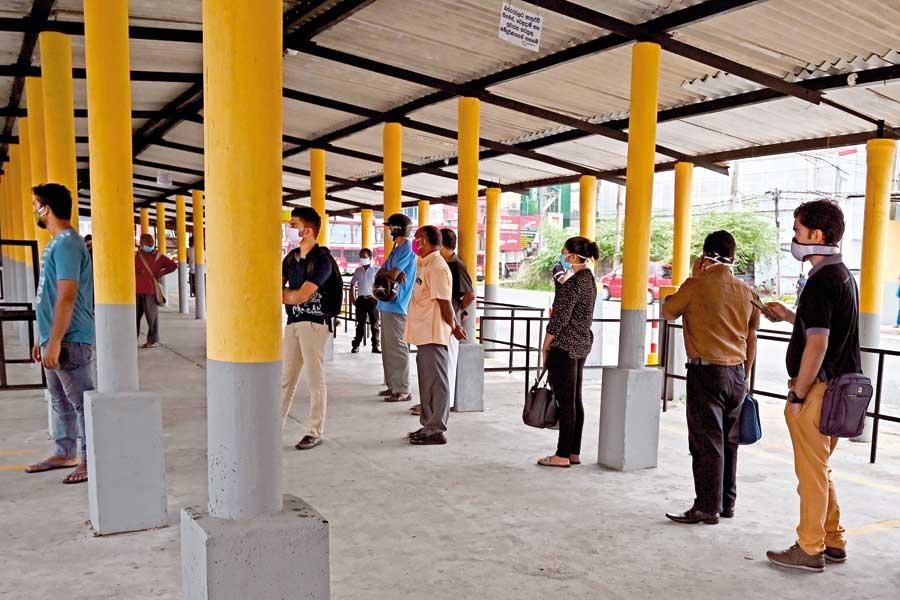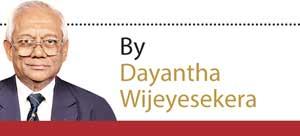Reply To:
Name - Reply Comment
Last Updated : 2024-04-25 00:00:00

Successive Governments have made various efforts to provide opportunities to youth to develop them to be conscientious, productive and useful citizens of the country and society
At least during the past three periods of Parliamentary Elections articles were presented focusing the need for a single Ministry for Human Resources Development (HRD) as was prevalent in the long past in our country and as  prevailing even presently in many countries both in the developed and developing world, including our neighboring country, India.
prevailing even presently in many countries both in the developed and developing world, including our neighboring country, India.
Since there are signs of such a possibility in the near future having realised the need for same it is prudent to strengthen the possibilities of such, by focusing the aims and goals.
The main aim of HRD should be to provide opportunities, mainly for the youth to develop to be conscientious, productive, useful citizens of the country and society. In doing so the rapid development of the country, the respective professions, quality of life, livelihood and living standards would undoubtedly be enhanced.
While there has been constant criticism of lack of such opportunities in our land, the successive Governments in power have made various efforts to provide same, by considering the vast numbers of training institutes despite both bottle necks and difficulties of entry and at the same time under-utilization of facilities.
The National Education Commission (NEC) is the main body established by an Act of Parliament, the chief responsibility being for Policy making and recommending same to the President at all levels of Education from Pre-School to Post Graduate Education. The Commission is represented by the Officials in Charge of General Education, Higher Education, Chairmen of University Grants Commission and also the Tertiary and Vocational Commission, Treasury Officials as ex-Officio Members and Appointed Members.
Although, it has no executive powers, it is responsible for National Policy formulation and their implementation through strategies adopted by the respective Commissions.
The NEC would undoubtedly be the body for examining Overall Policy recommendations forwarded by the respective Commissions and other Officials, Professionals and Private Sector and submitting to H.E. President.
The Universities Grants Commission (UGC) would continue to be responsible for University Education as a major component of Post-Secondary Education, and established under the Universities Act No.16 of 1978 (as amended), for admissions according to Government Policy for first degree programmes of Study up to Post Graduate Programmes and Research through the Universities and Institutes established under the said Act. The allocation of funds and maintenance of Quality and related functions through Review Panels and Standing Committees would also be its responsibility.
While goals of HRD is to meet the National needs of the country and personal aspirations of individuals depending on their skills and aptitudes, there should be facilitation of the bodies mentioned above for those who seek to achieve them.The National Human Resources Development Council (NHRDC) which is represented by many Secretaries of Ministries who could express the Ministerial needs while the private sector and the industry would reflect their respective varying needs.
The main reason or the “scape goat” for such a situation is often quoted as the lack of Career Guidance, it is actually lack of awareness or the difficulties faced by such officers in charge of guidance to keep abreast of avenues.
As a panacea, for the current disarray, dis-satisfaction, and unnecessary conflicts would be at three levels, namely (i) Single Cabinet Ministry level responsible for entire HRD, providing the overall coordination, (ii) State Ministry levels for common facilities such as curriculum development, Career guidance, career paths development and mutual recognition of qualification frameworks, Quality Assurance and Accreditation, Staff development and welfare, Rationalization, Resource allocation and fair distribution etc., finally (iii) Deputy Ministry levels at (a) General Education including Pre-School Education, (b) Vocational and Professional Education (c) Higher Education (ie post-GCE ‘A-level’).
With the possibility and hope of a single Ministry the development of aspects mentioned earlier could be strengthened, enhanced and promoted.
While taking great concern over under-utilization of existing facilities and the hindrances for admission, opening new institutes. while there are many under-utilized, without using the existing facilities should be carefully examined before embarking on new infrastructure expenditure. Rationalization of existing and excessive facilities methodologies and promoting collaboration should be given high priority for investigation and re-organization.
Lateral Entries, equivalency of qualifications, credit transfers, Recognition of Prior Learning (RPL), Mature Candidate Routes (MCR) are some such avenues where collaboration could be enhanced and beneficial to industries and professions.
Legality of existing facilities, re- allocating of those which are not legally positioned, to organizations where it is possible to locate and advantageous should be examined and implemented rather than new institutes being established.
"While goals of HRD is to meet the National needs of the country and personal aspirations of individuals depending on their skills and aptitudes, there should be facilitation of the bodies mentioned above for those who seek to achieve them"
Less focus on essentiality on the title “university” as some leading world renowned, highly ranked, seats of higher learning are not titled “universities” but are such as Massachusetts Institute of Technology (MIT), Indian Institutes of Technology (IITs), Asian Institute of Technology (AIT), Royal Melbourne Institute of Technology (RMIT – till recently)
Continuing diligently well proven alternate routes in the TVET sector for the award of Certificates, Diplomas and Degrees, which require strengthening for further productivity should be looked into and implemented.
Encouraging and thereafter insisting all tertiary and vocational courses to be accredited to NVQ framework would strengthen standards and make it more attractive.
Greater recognition of NVQ qualifications by Public sector and Private sector through amendments to Schemes of Recruitment and determination of satisfactory equivalent wages should be accelerated.
There are about Five Universities established by separate Acts of Parliament with special features outside, the Universities Act No.16 of 1978 (as amended), which should be under a Ministry in charge of the subject of HRD, for collaboration and interaction, but be governed outside the UGC.
For similar reasons, the Open University of Sri Lanka (OUSL) should have special features, admission criteria and teaching methodologies, and as in the early days mainly for those employed and/occupied in the relevant fields, taking a lead in “On-line and Distance Education”.
The well-established model during a ADB funded Project for Technical Education Development (TEDP), set up the Technical and Vocational Education and Training (TVET) structure from National Apprenticeship and Industrial Training Authority (NAITA) institutes, Vocational Training Authority (VTA) centres, Technical Colleges and other training institutes both Public and Private up to NVQ level 4 (Certificate level). The National Youth Council Services Council (NYSC) programmes – for those seeking short duration livelihood and skills upgrading programmes, are also available, not necessarily for NVQ qualifications and the NAITA concentrating more on “Apprenticeship Training “as it was termed and intended.
Promote those with NVQ level 4 Certificates, to proceed to one of the Nine Colleges of Technology (CoTs), located as one in each Province to be awarded NVQ level 5 & 6 (at Diploma level) or others registered by TVEC for NVQ levels 5 & 6 from there to proceed to the University of Vocational Technology (UNIVOTEC) along with those with middle level qualifications (such as NDT, NDES, HNDE) entering laterally to proceed for a degree at NVQ Level 7 for a Vocational Technology degree or with Andragogy (Pedagogy) education and training to the B Ed(Tech) degree for the technical teacher training. This also may be possible to any other degree awarding institutes evaluated and recognized as per Universities Act) conducting relevant NVQ level 7 TVEC accredited courses in the future.
The Nine CoTs could serve as the so called “proposed Campuses “of UNIVOTEC as was originally intended as they already have the infrastructure and equipment some with “University Colleges” across the road.
The legality of “University Colleges” attached to UNOVOTEC admitting mainly GCE “A-level Technology stream” students should be verified according to the UNIVOTEC Act of Parliament and its objectives, whereas there is provision for such Colleges to be established under the Universities Act instead of setting up proposed new “District Universities” as was done in the past as Affiliated University Colleges (AUCs). While this would relieve the UNIVOTEC of undue load it would meet the intention and reduce expenditure of setting up new universities for the GCE A-level (Technology stream) students by the UGC. With possible single Ministry and collaboration there should be action taken for initial interaction and future amalgamation between the NVQ framework and the Sri Lanka Qualification framework (SLQF).
There are over 20 Ministries having staff development programmes mainly for their own staff, and such programmers if they are mapped to relevant NVQ and/or SLQF levels could make the route more attractive for entry at staff recruitment and also useful when promotions are considered.
With the NVQ qualification alternate route gaining popularity it is essential that the Public sector schemes of recruitment include these qualifications into their Schemes of Recruitment (SORs).
.The new development of the 13 year schooling Programme, in General Education has to be considered with an open mind. While the opportunities for higher Education (ie for those with GCE “A- Level qualifications) still remains as before with such qualifications to those aspiring to enter Conventional University education and/or to Degree Awarding Institutes recognized under the Universities Act, OR those who prefer Vocational and Professional education to start their career in such, from secondary school level at year 12/13, by obtaining up to NVQ level 4 qualifications, is possible with a solid foundation in vocational education in general and proceed further thereafter along a specific occupation in the TVET sector.
(These views are expressed purely for the sake of Youth Career Development, National Development and development Of recognized Professions)

Add comment
Comments will be edited (grammar, spelling and slang) and authorized at the discretion of Daily Mirror online. The website also has the right not to publish selected comments.
Reply To:
Name - Reply Comment
US authorities are currently reviewing the manifest of every cargo aboard MV
On March 26, a couple arriving from Thailand was arrested with 88 live animal
According to villagers from Naula-Moragolla out of 105 families 80 can afford
Is the situation in Sri Lanka so grim that locals harbour hope that they coul